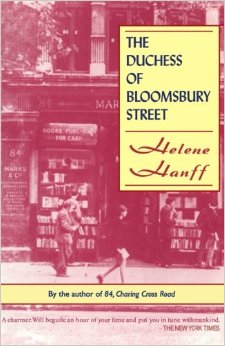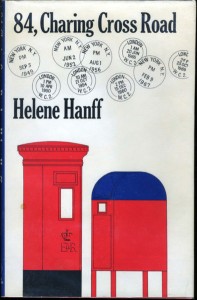 The other day, reading Mental Multivitamin, I discovered there is a sequel of sorts to 84, Charing Cross Road, which is one of my favorite books. On certain days, it is my favorite book, and certainly it is one I return to ever more frequently, as time goes on.
The other day, reading Mental Multivitamin, I discovered there is a sequel of sorts to 84, Charing Cross Road, which is one of my favorite books. On certain days, it is my favorite book, and certainly it is one I return to ever more frequently, as time goes on.
Now, why it hadn’t occurred to me—obsessive googler and binge-reader that I am—to hunt up the rest of Helene Hanff’s books, given my really almost aching love for 84, Apple of My Eye, and Letter from New York (a book that shaped New York City for me before I met it in person)—why this uncharacteristic lack of ferreting-out on my part, I cannot say. Except perhaps that sometimes a kind of obliviousness is my brain’s way of making good things last…I’m far too prone toward immediate gratification when it comes to books, especially older ones by deceased authors, books I can blithely justify snapping up for a penny + $3.99 shipping on Amazon Prime, and clutch in my greedy hands two days later.
(I have this deal with myself: used books only if the author is no longer living. My way of supporting my comrades in the trenches, and also of keeping my floors from collapsing under the weight of all the books I would spend the grocery money on if I didn’t make up rules for myself.)
Anyway, there it was at MM: The Duchess of Bloomsbury Street, a string of quotes (I love how Ms. M-mv does that), Helene Hanff’s diary account of her long-dreamed-of trip to London, two years after Frank Doel’s death. 48 hours later, it was mine, formerly the property of Salt Lake County Library System, Whitmore Library. Seems to be a first edition, published in 1973.
I love Helene Hanff. Not just her writing, but her, the person, the crackling, opinionated, piercingly observant New Yorker who toiled over Ellery Queen scripts and her own never-to-be-produced plays, and who, for twenty years, fired off missives exploding with personality to a mild-tempered, unfailingly polite bookstore employee who died before she could get to England to meet him. It’s Frank’s wife, Nora, and daughter, Sheila, who meet Helene at the airport in the beginning of Duchess. They, too, had come to know and love her over those twenty years.
I love her like an aunt; perhaps I project a little of my beloved Aunt Genia onto her, hear certain tart remarks in Genia’s voice. Their lives were nothing alike, and Aunt Genia never lived in New York, but they share an unabashedness of opinion and a vast generosity of spirit. My aunt died in 1995, Miss Hanff in 1997, and I miss them both. But Helene I get to revisit endlessly. WHAT KIND OF A PEPYS’ DIARY DO YOU CALL THIS? pops into my head at unexpected intervals, and I laugh out loud, sometimes while standing in line at the post office or pushing a cart through Target.
84, Charing Cross Road, about which I’ve written before, was her first really successful published work, and its success was a tremendous surprise to her. People wrote and called her from all over the world; when she was hospitalized shortly before her London trip, strangers sent flowers and presents. In London at last, she was continually receiving invitations from perfect strangers who’d read and loved her book, and were so happy she was visiting their city. I keep crying, living these days with her, and then she’ll say something acid and I’m howling. Oh, I love her.
Something else I didn’t know about her until this week (when my google reflex did kick in at last, and I read all her obituaries) was that she considered herself uneducated. She uses that very word in Duchess. It’s astonishing she should have felt that way. She ran out of money after a year of college, that’s why; but there can’t have been many of her generation who were better read than she; she devoured and re-devoured books, the entire canon practically (except fiction; she far preferred essays and history) and knew chunks of them by heart, and all through her books she cross-references like crazy. She was a walking Wikipedia.
Now, reading Duchess of Bloomsbury Street, I find that’s exactly how her education happened: like a long, looping chain of links.
But Oxford I have to see. There’s one suite of freshman’s rooms at Trinity College which John Donne, John Henry Newman, and Arther Quiller-Couch all lived in, in various long-gone eras. Whatever I know about writing English those three men taught me, and before I die I want to stand in their freshman’s rooms and call their names blessed.
Q (Quiller-Couch) was all by himself my college education. I went down to the public library one day when I was 17 looking for books on the art of writing, and found five books of lectures which Q had delivered to his students of writing at Cambridge.
“Just what I need!” I congratulated myself. I hurried home with the first volume and started reading got to page 3 and hit a snag:
Q was lecturing to young men educated at Eton and Harrow. He therefore assumed that his students—including me—had read Paradise Lost as a matter of course and would understand his analysis of the “Invocation to Light” in book 9. So I said, “Wait here,” and went down to the library and got Paradise Lost and took it home and started reading it and got to page 3 when I hit a snag:
Milton assumed I’d read the Christian version of Isaiah and the New Testament and had learned all about Lucifer and the War in Heaven, and since I’d been reared in Judaism I hadn’t. So I said, “Wait here,” and borrowed a Christian Bible and read about Lucifer and so forth, and then went back to Milton and read Paradise Lost, and then finally got back to Q, page 3. On page 4 or 5, I discovered that the point of the sentence at the top of the page was in Latin and the long quotation at the bottom of the page was in Greek. So I advertised in the Saturday Review for somebody to teach me Latin and Greek, and went back to Q meanwhile, and discovered he assumed I not only knew all the plays of Shakespeare, and Boswell’s Johnson, but also the Second Book of Esdras, which is not in the Old Testament and is not in the New Testament, it’s in the Apocrypha, which is a set of books nobody had ever thought to tell me existed.
So what with one thing and another and an average of three “Wait here’s” a week, it took me eleven years to get through Q’s five books of lectures.
The original rabbit-trailer. My hero. Q’s “five books of lectures” can be had for nothing, nowadays, along with probably all of the works he references. If I start now, I’ll be as educated as Helene by 2025.
(Oh heavens. That number just gave me the vapors. That’s officially the future, man.)
Helene Hanff eventually wrote a book about her autodidacticism called Q’s Legacy. Needless to say, it’ll be here by Tuesday.
Add a Comment


